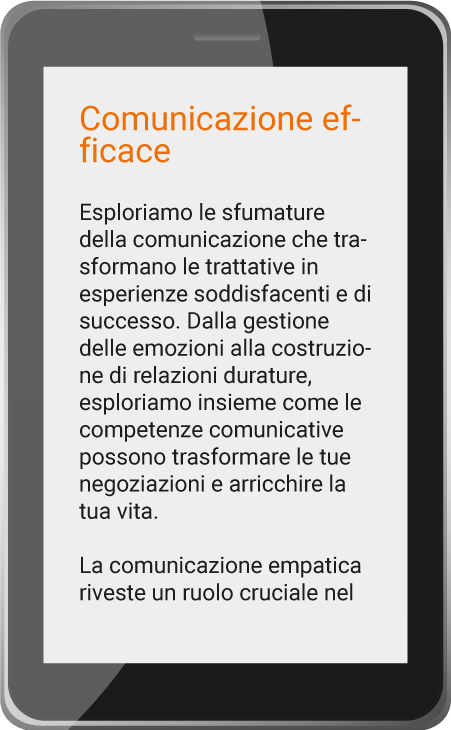Active listening is a key skill in effective negotiation and communication. It consists of listening carefully to what the other party is saying, not only to understand the words, but also to grasp the underlying meaning and associated emotions. During a negotiation, practicing active listening can create an atmosphere of trust and openness between the parties involved.
Active listening is an intentional and engaging process that goes beyond simple auditory perception. It is a crucial skill in negotiation, requiring focused attention, empathetic understanding and appropriate response to the other party.
In negotiation, active listening plays a key role because we are able to fully understand the negotiating partner’s point of view, needs, interests and concerns. This enables us to create an atmosphere of trust and mutual understanding, facilitating collaboration and the construction of win-win solutions for both parties.
The importance of active listening as a fundamental skill in negotiation cannot be underestimated. Often, we are inclined to focus exclusively on our own needs and goals, neglecting the importance of listening carefully to the other party.
Active listening promotes mutual understanding because it allows us to grasp not only the words expressed by the other party, but also the body language, intonation and emotional energy that accompany the message. This deeper understanding allows us to gain a more complete view of the other party’s situation and motivations, promoting more effective dialogue and greater awareness of each other’s needs.
In addition, active listening facilitates the creation of win-win solutions. When we are able to fully understand the other party’s needs and interests, we are able to identify opportunities for collaboration and develop solutions that meet the needs of both parties involved. Active listening allows us to explore options and alternatives that might otherwise be overlooked, contributing to the creation of more satisfying and lasting agreements.
It offers numerous advantages in negotiation. First, it fosters the creation of mutual trust between the parties involved. When people feel heard and understood, an atmosphere of openness and mutual respect is established, which facilitates dialogue and the search for common solutions.
In addition, active listening facilitates mutual understanding. Through focused attention and empathy, we are able to grasp the nuances of the other party’s message, including the underlying emotions. This deeper level of understanding enables us to find solutions that meet the needs of both parties, improving the chances of mutually beneficial outcomes.
On the other hand, poor listening can have negative consequences for negotiation. Lack of active listening can lead to misunderstanding, misunderstanding, and conflict. When one party does not feel heard or understood, it may become more distrustful and resistant to cooperation, making it difficult to reach a satisfactory agreement.
To practice active listening effectively, some key skills need to be developed. Concentration is key: it requires eliminating distractions and giving full attention to the other party, without interruptions or premature judgments.
In addition, the ability to ask relevant questions is essential to deepen understanding and gain key information. Open-ended questions encourage the other party to express themselves freely, while probing questions can help clarify obscure points or further explore the other party’s interests and concerns.
Finally, the use of body language to demonstrate interest is an important component of active listening. Gestures such as eye contact, head tilt, and replication of facial expressions can convey to the other party that we are genuinely interested in what he or she is saying.
Active listening is based on three basic components: attention, understanding, and empathic response. Attention requires being present in the present moment and avoiding mental or physical distractions that may interfere with communication.
Understanding involves going beyond the literal meaning of words, seeking to understand the emotions, needs and interests implicit in the other party’s message. This requires empathy and the ability to put oneself in the other person’s shoes.
Finally, empathic response is the ability to respond to the other party in a way that makes them feel heard and understood. This can include reflections of emotions, summarizing the content, and rephrasing key points made by the other party.
There are several active listening techniques that can be used during a negotiation to improve communication and foster mutual understanding. One of these is content repetition, which involves summarizing or rephrasing what the other party has said. This shows that we are listening carefully and provides an opportunity to clarify any misunderstandings.
Another technique is paraphrasing, which involves repeating in our own words what the other party has expressed. This allows us to check our understanding and provide accurate feedback to the other person. For example, we might say, “So, if I understand you correctly, you are saying that…”
Emotion reflection is another powerful technique. It consists of recognizing and reflecting the emotions expressed by the other party, showing that we are empathetic to his or her emotional experiences. For example, we might say, “I feel like you are frustrated with the situation.”
These techniques can be applied during a negotiation to create an atmosphere of trust and openness, promoting more effective communication and better mutual understanding.
Active listening plays a key role in identifying the other party’s interests and concerns. Through focused attention and empathy, we are able to grasp not only what is explicitly communicated, but also hidden motivations, values and desires.
Listening carefully allows us to identify the core interests of the other party, going beyond their immediate demands. This gives us the opportunity to find creative solutions that meet the needs of both parties, creating a win-win environment.
In addition, active listening helps us understand the other party’s concerns and fears. This allows us to address them appropriately and seek solutions that mitigate or resolve those concerns. Empathy and sensitivity to the other party’s concerns create a more collaborative negotiating climate and facilitate the building of lasting agreements.
Key points about the importance of active listening in negotiation:
Active listening is a key skill in negotiation, as it fosters mutual understanding and the creation of win-win solutions for all parties involved. Some key points on the importance of active listening include:
- Building mutual trust: Active listening promotes the creation of trust and openness between the parties involved, facilitating dialogue and cooperation.
- Deepening mutual understanding: Through active listening, we are able to grasp the nuances of the other party’s message, including underlying interests and concerns. This enables us to find solutions that meet the needs of both parties.
- Identification of interests and concerns: Active listening helps us identify the other party’s interests and concerns, going beyond immediate requests and seeking creative solutions that create a win-win environment.
- Improved communication: Active listening improves the quality of communication, reducing misunderstandings and conflicts resulting from a lack of mutual understanding.
- Effective problem solving: Through active listening, we are able to identify solutions that take into account the needs of all parties involved, increasing the chances of achieving win-win outcomes.
To develop and improve active listening skills, consider the following practical tips:
- Be deliberate and focused during negotiations, avoiding distractions and demonstrating genuine interest in the other party.
- Make use of relevant questions to deepen understanding and gain key information.
- Use body language to demonstrate interest and involvement, such as eye contact and body tilt.
- Practice active listening techniques, such as repeating content, paraphrasing and reflecting emotions, during negotiations to foster mutual understanding.
- Maintain an empathetic and open attitude, seeking to understand the other party’s perspectives and concerns.
- Avoid premature judgments and listen all the way through before responding or drawing conclusions.
- Be patient and willing to take the time to listen and fully understand the other party.
In conclusion, active listening is a key negotiation skill that fosters mutual understanding and the creation of win-win solutions. By developing active listening skills and applying appropriate techniques, we can improve the quality of our negotiations and achieve more satisfactory outcomes for all parties involved.



